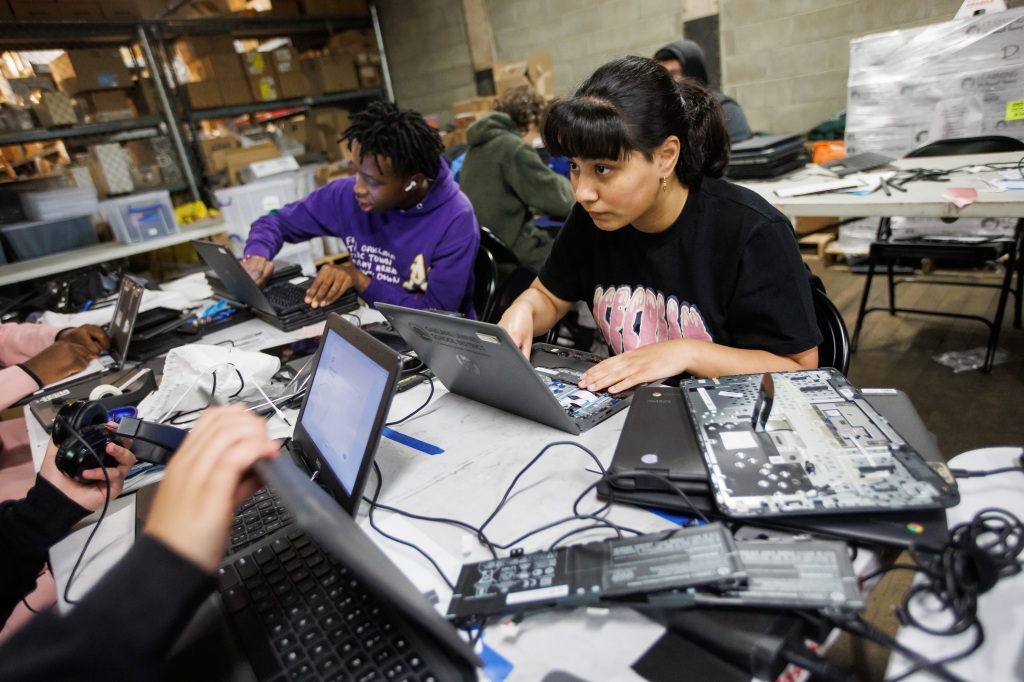There are few things quite as emblematic of late stage capitalism than the concept of “planned obsolescence”.
“These updates depend on many device-specific non-Google hardware and software providers that work with Google to provide the highest level of security and stability support,” said Peter Du, communications manager for ChromeOS. “For this reason, older Chrome devices cannot receive updates indefinitely to enable new OS and browser features.”
Bull. Shit.
I have an 8 year old iPad that can still use Amazon video and can still run Netflix, and google drops support for these computers as early as 3 years. I’m not an Apple fanboy but that is absolutely ridiculous.
Apple does the same thing if you don’t already have those installed
My 2nd gen Apple TV is garbage. Nearly all the apps fail to load now. 🤷♂️… I suppose I can try jailbreaking it but it sure feels like someone is trying to force me to upgrade my hardware.
That’s a product that hasn’t had an Apple update since 2014. What realistically do you expect hardware manufacturers to do with actually old hardware? Lose money supporting it forever? This is kind of the opposite case from the chromebooks.
I will give credit to Apple on that one because android phone manufacturers are now supporting their phone for longer because of how long Apple is supporting them.
I remember back in the day when I had apple devices where they would push updates for devices long past their capability to actually run the updated software. Rather than refuse the update or get a pruned patch with security fixes only, it would force updates and bloat your phone and grind it into unresponsive unusability after a few years.
I hear that’s not so much the case anymore, so that’s nice. But I remember. The main reason I upgraded my phone was because of that, the hardware was great, but I could hardly use the software anymore even after clean installs.
My point being, I guess, extended support is great if managed properly but it can also become a bludgeon with which to drive you toward the new generations of devices.
long past their capability to actually run the updated software
Well, Apple intentionally slowed those devices down to make the users update, instead of using an insecure device, that would’ve provided a good experience otherwise.
And these days Apple is retiring devices arbitrarily for profits too. For example this year they are retiring the Iphone 8, which has better hardware, than the ipad 2018 that is still being supported…
That slowness was, at least officially, for the battery health. Do you have the support to prove otherwise?
These conversations bring the weirdest people out of the woodwork. I remember talking with a guy who explained to me how crap Apple laptops were because you (according to him) can’t customise them. Turns out he’d never owned or even used an Apple laptop. I was like, why do you care?! Especially about something you have no experience with!
The problem is that those people often can’t read. Everyone has a biased opinion or two they forgot to back up with support, but those people can’t be argued with. I want to know how to talk with them.
And then if I recall correctly (though I can’t be bothered to look) didn’t they get sued for slowing phones?
So people were mad that their phones battery wasn’t holding a charge anymore, “im being forced to upgrade”, so Apple throttled older phones to keep the battery running, aka allowing people to keep their phones longer, and then they got sued for slowing down phones lol.
I am an apple fan boy, I wont hide that. But it does seem like they tried to do a “good” and make peoples phones last longer, and then got sued.
Also the whole forced upgrade just isn’t apples game IMO. Do they want you buying the new one every year, of course. But the more important thing is that you keep using AN iPhone at all. Stay in the ecosystem, stay in the app store, stay paying for icloud, etc.
Going to a new phone gives the user a window to move away from IOS. (Though most won’t haha)
Actually yes. I bought a brand new -discounted old stock- Iphone 4s for my mum near the end of the ios 8 cycle. The day before we installed ios 9 on it, it had okay performance and good battery life. Following the update to ios9 the performance went to complete shit. (the battery remained usable for 2 more years after, but it was not a good experience for her)
How does that prove that it was not for your battery health?
I think the more probable reason is that EU regulators were unhappy with this for a long time and have now put 3 years of OS updates and 5 years of security updates into law. Low cost Android manufacturers don’t care what Apple does.
deleted by creator
has to be dumped
OpenCore Legacy Patcher, Linux, ChromeOS Flex, and maybe even Windows 10 could all be options for that Mac. As-is ot would still be perfectly safe to use offline too.
What year is the mini from? I run a Plex server off a 2010 Mac mini.
Apple devices are serviceable for far longer after the OS stops updating than windows/android devices in my experience. But regardless, Apple doesn’t discontinue support as early as 3 or 4 years. Even you have to admit that is ridiculous of google.
You’re also not a giant customer who needs security and it services like a school district. 3 years might be early, idk, but in plenty of enterprise or institutes replace their hardware every so often.
My 2012 laptop runs windows 10 perfectly fine and has the latest security updates. We’re way past the point of using hardware limitations as an excuse for companies to drop support early.
I don’t see why a school should have to replace their basic computers with an equally basic computer after 3 years unless it’s broken beyond repair. I don’t think the OS itself is doing much more than what an enterprise copy of windows does for security.
The only reason Windows 11 can’t run on super old hardware is because of the misleading decision to require secure boot (a feature of the motherboard that stops unsigned OSes from booting). The metaphor I use is that it is like a car radio manufacturer refusing to let a car radio work in cars that don’t have car alarms then calling the radio secure because of it.
The secure boot requirement can actually be circumvented pretty easily
Give me the deets please 👍
Yeah, Windows 11 is a bad example of supporting old hardware because Microsoft stupidly and maliciously requires secure boot and TPM2 just to lock out otherwise fine hardware from using Windows 11. You can run Win11 without secure boot or TPM2 with mods, the hardware is perfectly capable.
Or just put Linux on it. Linux runs on damn near everything because it’s designed to run on damn near everything. There’s no profit motive to only support Linux on the newest and shiniest devices like there is for Apple, Google, Samsung, and even Microsoft (who sells most copies of Windows preinstalled on new PCs).
How do I go about running Win 11 without secure boot? I have a BIOS motherboard from 2009. Windows 10 is EOL relatively soon. I plan on getting a new computer and using some genre of Linux but I’m curious what to do about the current one.
Funny you should say this. I have a 2012 Retina Macbook Pro, and yes it is running Windows or Linux with all the latest updates. However, Apple stopped supporting it in 2020. It’s too old for MacOS updates.
I’ve even seen a guide that will allow me to hack past the normal BIOS restrictions/allow me to put Windows 11 on it.
Hih
I have a 15 year old laptop that can still browse the web and play YouTube videos just fine because PC is a standardized platform with an open standard bootloader and a BIOS/UEFI system designed to abstract the hardware so the OS doesn’t have to be tailor-made to the hardware. Mobile devices are absolute shit in this regard. Why does the OS have to be specifically built to target one particular device?
It shouldn’t. End of question. This applies to Android, ChromeOS, and Apple devices equally.
I’m glad mobile Linux is starting to take off and there seem to be some standards emerging around ARM booting, even if it is still an absolute shit show compared to the standardization of UEFI/BIOS on x86/x86-64. I know some ARM systems can UEFI boot but it’s few and far between still so most devices still need a tailored kernel at least. That said, ARM Linux doesn’t need the entire freaking stack tailored to a device like Android and iOS do.
Couldn’t agree more. Every computer I have, no matter how old, can connect and do most things fine.
deleted by creator
Fuck these Corporations, the only reason for this is to get the public school systems to constantly buy new chromebooks.
Companies making mass market devices should be required by law to support them indefinitely, or until they publish the technical specs sufficient for community support and repair.
The upgrade cycle they’re allowed to get away with today is not only a ridiculous drain on people’s money, but also a shameful source of pollution and waste.
until they publish the technical specs sufficient for community support and repair.
I want to see phones with no further official OS support have their boot loaders opened up so a lightweight OS can be installed on them instead. I’ve had iPhones in the past that have been absolutely rock solid after a battery replacement that lost iOS support, and with that a whole bunch of resale value. So I now tend to sell mine a year or so before they’re likely to be dropped.
But I genuinely think that I’d hold on to an iPhone that could have an alternative OS installed. This is, of course, why none of the major manufacturers allow this. Gotta put the profits ahead of the ethics.
Actually in the Android community Sony helps you unlock your bootloader and offers official AOSP sources for their devices that you can compile and install yourself.
I have no idea why people are enamored with Samsung.
Ad campaigns, most likely. I always seem to see ads for Samsung phones, but not as often for Sony brand ones. I do agree Sony does a much better job about opening up the bootloader, versus Samsung punishing you for trying to open your own paid for device up.
Exactly, bootloader locking should be downright illegal. If EU wants to make phones last, they need to mandate that you can unlock the bootloader (WITHOUT bullshit like having to get an unlock code from the manufacturer). Want to lock it down for certain software features like payments, etc? Ok, fine, I can live with that, so long as I can unlock it if I so choose and keep all HARDWARE functionality intact.
On another note, the manufacturers should be upstreaming and mainlining their drivers in the Linux kernel. ChromeOS and Android are both built on Linux, yet they keep all their hardware support in forks and branches that are left to wither and die rather than submitting those changes upstream. Only a select few ARM SoCs have mainline support. If the companies would just put a bit of extra effort into doing things right rather than the shitty hack jobs they do now to get products out the door as fast as possible, we could have a much better ecosystem around old phones. Of course, the shittiness is by design.
Comments upon comments ignorant of the realities of the privacy laws governing this domain and the implications on firmware, driver and OS security support. “Just install Linux on it” is a completely unworkable solution. As some have pointed out, the places where this is done have a much thicker IT departments staffed with higher grade professionals to make it work. The thing to be mad here about is the shit support from vendors across the stack. If I had to guess, the worst offenders are probably the SoC vendors who typically ship firmware and driver updates as is the tradition.
deleted by creator
That’s exactly the problem. The standard GNU/Linux distro isn’t suitable to allow carrying the responsibility that an innumerable number of users with physical access won’t be able to pwn those machines. Machines that are used by others too. You absolutely can make an OS like that out of Debian or Ubuntu, or what have you. Google has - Chrome OS - but it’ll take a significant development effort. You’d have to basically redo at least some of the work they’ve done. And let’s say you did all of that. Then you end up deploying it on an ARM-based fleet. And there’s a wild vulnerability in the WiFi firmware blob, and the SoC vendor no longer supports it. Every student has root and we’re back to the original problem. 👨🚀🔫
And that’s why instead of getting hardware from a vendor and hoping for the best, you might want to get it in writing that they’ll support their crap till a date. Then you stamp that as the EOL date for that laptop and you present it as part of the spec to whoever might want to buy this laptop. There’s no escaping this problem unless there are no proprietary blobs on the system, which is unlikely for ARM, or you have a solid development team and you’re large enough to have a source sharing contract with the vendor that lets your team fix the vulnerabilities and support the hardware for as long as you like. It’s probably much easier to achieve on x86, which costs more per unit up front.
Thank you for sharing your experience along with that link.
deleted by creator
What difference would the kernel licence make in this context?
Yeah, bulk imaging computers is really only limited to how many you can hook up to the network. I used to have to image hundreds of computers a day at times, and really the longest part was walking around and restarting them all so they’d PXE boot. The actual process maybe took 2 hours since all the computers were on 100Mb/s connections.
I converted one of these Chromebooks to Linux as a test project and the results were, not good.
To start, they have a bootloader lock screw under the motherboard, so you have to take the entire laptop apart to load anything but unsupported ChromeOS.
Then you have to use a Google tool, can’t remember the specific one, to swap the bootloader. That might be possible to automate but I didn’t look into it because…
… The hardware sucks. We’re talking like 4GB of storage on a lot of these Chromebooks. The driver support is all over the place, and there are issues everywhere even on “supported” distros.
With the vast amount of junk Chromebooks out there, I’m sure community hospice support will get better, but it’s never going to be an easy bulk conversion because of how common the bootloader locks are.
This sounds like there’s a market for a Linux distro that behaves like ChromeOS and can be centrally managed.
The problem comes down to education institutions. I remember when we got Chromebooks in my highschool (8 years ago) admins forgot to turn of developer mode and half the school unenrolled the Chromebook managing to bypass all restrictions. This went on for half a year until one day our school needed to run a state exam (more for measure of schools performance not as a college entrance exam or anything).
The computerized testing program required deploying a specific chrome app accessible when chrome book is logged out (can’t just download from chrome web store). When they tried to push the client since half of Chromebooks were unenrolled it failed. This required the school it to recall pretty much all chrome books to manually re enroll all of them and disable developer mode (prevents unenrolling and prevents sideloading Linux).
Problem is if older Chromebooks are used for Linux in an educational environment there would be nothing stopping a student from whipping up a bootable USB and dumping another distro (bypassing restrictions). I’m also not sure if there is a enrollment mode equivalent Linux (there may be but not sure).
At least that’s my two cents (not a school it admin just a memory from the past 😉).
Problem is if older Chromebooks are used for Linux in an educational environment there would be nothing stopping a student from whipping up a bootable USB and dumping another distro (bypassing restrictions). I’m also not sure if there is a enrollment mode equivalent Linux (there may be but not sure).
They could just disable booting from USB drives in the bios and password protect it. They could install something like Fedora Silverblue, or even customize the image used to include whatever modifications they want. Any changes they made to the image would be propagated through autoupdates. Kids wouldn’t have root, so they couldn’t forcibly install a different OS. Of course they could install flatpaks to their home directory, which is probably something administrators would want to prevent, but a knowledgeable student can always find ways to do what they want.
This of course requires schools/districts to hire people to manage that stuff, which could be a problem.
Good point. I wasn’t sure if Chromebooks had a normal bios with password protect/option to disable USB boot for non chrom os operating systems.
I never really understood the need for that strickt controll of the hardware… Who cares if Linux is sideloaded or if students unenroll. Imho I think if you need that strickt controll you are bound to get so many unnesseary issues down the line. Instead let student 6se what ever the fuck they want and for security just make sure they WiFi/ethernet is secure and locked down and any services the students need are behind a secure 2fa login. Treat any device as untrusted is more healthy for your security in the long run imo. If students need special software that they can’t run on their own machines you can lend them a machine for that specific task for a specific time. Problem solved.
I never really understood the need for that strickt controll of the hardware
Federal laws and rules for educational technology:
CIPPA - https://www.fcc.gov/consumers/guides/childrens-internet-protection-act
COPPA - https://www.ftc.gov/legal-library/browse/rules/childrens-online-privacy-protection-rule-coppa
and to an extent
FERPA - https://www2.ed.gov/policy/gen/guid/fpco/ferpa/index.html
I manage my schools IT - and when we started out a few years ago my board were pushing aggressively for Chromebooks. The service provider were talking about how they could roll out hundreds of Chromebooks at the touch of a button. When I asked about the lifespan of a Chromebook I got vague answers. I knew we would get a couple of years max out of each one so I instead pushed for much more expensive MacBooks. 5 years on and we are still using our original MacBook we got back then, with photoshop and other software.
I’m curious how something like Framework laptops would pan out for this use case. New they are currently priced similarly to a macbook, but in theory they are indefinitely serviceable.
This is true! And you also don’t have to worry about the proprietary-ness of MacOS, and there are also (certain ways)[https://github.com/Gictorbit/photoshopCClinux] to get photoshop on Linux too.
Framework laptops are the exact opposite of what you’d want in a school environment. This is how you blow your schools IT budget out the window. Cheap, disposable, consistent configuration and manufacturer supported are the key concerns.
These are kids with various standards of computer literacy throwing them in their bags which they also kick around and treat pretty harshly all day long. A $4k Framework-style laptop is just silly.
Not necessarily! The Chromebook version starts at 1k, with a no-OS one 50 below that, both pre-assembled. Additionally, the higher build quality with the ease of part replacements would significantly reduce the load when it comes to repairs. The downsides of course are the high up-front cost, but this could be reduced by releasing in groups (by grade level, for example.) Also, an advantage with unrestricted devices like this is that it’s very easy to flash/install whatever you want, including whatever user permissions and applications are needed to ensure smooth operation (e.g. specific DNS/VPN configuration for content blocking or access to school materials.)
Either that, or I’m speaking out my ass. Still though, there’s a lower carbon footprint involved when you don’t need to huck the whole device in the trash once something breaks. That should at least be some kind of incentive…
You can buy 2-3 cheap Chromebooks for that which will theoretically last 10-15 years though for your $1k. Basically no schools are going to turn that up vs a $1k Framework most of which will not last half that long with kids using them.
Sucks for the environment though as you say, I wish it were different.
My comment is in the context of someone who said they’re 5 years into their plan of buying MacBooks instead of cheap Chromebooks and they’re still happy with their decision. If they had said reality panned out as you suggest, then yeah, my comment would make less sense.
But then again, in theory, the more damage the laptops are going to suffer, the more you’ll save over time if they’re easily repairable
Also, you’re right that $4k for a framework is ludicrous. I was thinking more like $1500. But idk what MacBooks OP purchased.
Yeah, I don’t understand who’s buying these at all at that price to be honest. I’m not sure if its the profit margin they want or production-related issues due to the low number runs they’re probably doing.
x86 Macs are not the greatest example of longevity at this point.
Not ideal that we had a percentage of our MacBooks on x86 cpus when the M1’s came out. But I will say they are still running strong. Others have pointed out that newer OS updates won’t work on the older MacBooks. But that’s not a deal breaker for us as we don’t run anything that’s OS specific enough to make the older models obsolete. We have factored in 5 - 7 years of use out of the laptops and we’re on course for that. I myself and using a 10 year old MacBook at home, and although I can’t fire up the latest Adobe Premiere on it, I can certainly get 99% of my work done on it.
Really? I just handed down a 2017 MacBook Pro – still supported by Apple, meaning it runs the latest OS, and gets patches.
Can you give me an example of any other device with longer software support from the original vendor, at no cost to the end user?
Ironically the only way to use some old Macbooks these days is to put Chrome OS Flex on them. Apple is far more aggressive about killing off old hardware when it feels like it. You can still use them as-is of course but over time the browser and other web based apps degrade and refuse to work because of issues with TLS, CA certs (expired), discontinued backend APIs and unsupported web content APIs.
I have a 2015 fully specced 15" MacBook Pro that I’m trying to sell at the minute, which is proving more difficult than I thought it might, partly because the M-series Airs are so compelling, but also because it’s an incredibly powerful machine that’s officially locked to Monterey, which is now two years old.
Beyond Apple’s need for financial gains, I don’t think there was a compelling reason to leave that model out of the Ventura upgrades.
I had it running Ventura via OCLP, which it had absolutely no trouble with at all. But I can’t sell it in that state because while it’s pretty stable, there is still some extra fiddling needed with running an unsupported OS.
Monterey still gets security updates. :)
But they’re not as fun as feature updates!
For me issues have only really started around the 5-8 years mark depending on the device which is ok-ish since the hardware is extremely outdated then anyway.
Chromebooks expire? What the fuck? Are there logistical problems with installing Linux on these devices?
Chromebooks are unfortunately meant to be disposable like phones. Nobody should buy one, but unfortunately schools get them because they’re cheap.
On an individual basis you can install Linux, but for millions of devices thrown out by schools around the world, there’s no solution because the residual value is so tiny, you’d have to pay the techs minimum wage and hold a gun to their heads to get enough devices per hour to justify it.
I used to work at a refurb place and when we saw a chromebook that wasn’t immediately OK (it could’ve had a bad display or keyboard, or locked to an account), we just removed the eMMC, smashed the chip and threw the device on our scrap pallet.
Give them to the kids with a QR code guide sticker about installing Linux on them? I’m not a kid, but I would love if someone “threw” a couple of these in my general direction.
Almost certainly not allowed, schools are responsible for privacy and security on these devices.
Most of these Chromebooks are 3-4 years old and in really rough shape. Kids use these things for literally everything. You likely wouldn’t even want them for free. Probably bio-waste at this point.
A friend asked me to fix their daughter’s desktop and also asked if she could borrow an old laptop to use in the meantime. The desktop was disgusting with food smeared all over the keys and display. I cleaned it up and fixed it and sent it back. My laptop was returned with food smeared everywhere after just a few days. I was stunned.
I think its more that Google supports them for only so long and then they go bitrotten. The final update for these devices should also unlock the firmware so people can wipe the device and install Linux or something on it.
Anyone know where I can buy or place bids on batches/pallets/etc of them? I want to self host a bunch of shit using those cheap computers that are being thrown out.
Same here!
Honestly people should stop buying Google products…
All of these machines make for decent Linux laptops. I picked up an EOL Chromebook for $35 last year and installed Debian on it. Decent little machine. Not terribly fast but very useable.
These are Linux laptops. But yes, they’ll work better if you put your preferred distro on them.
Good to know. Is it still a PITA to make the firmware let you change the OS?
Most modern ones it’s just commands you have to run. You can usually find an easy walk-though on the MrChromebox website. I haven’t seen one that required a jumper or anything in a LONG time.
I’ve been looking into getting a cheapo laptop to take outside, and Chromebooks caught my interest. However, literally everyone I spoke to about this idea recommended against it. After researching all the nuances to putting baremetal Linux on a $40 Chromebook (BIOS screws, firmware patches, etc), all so I could have 2GiB RAM and 16GiB of unreplaceable storage, I asked myself what the point even was. I might as well buy a(nother) Thinkpad T40 at that point.
Glad I didn’t go with the Chromebook. Got a 2018 HP secondhand from a local college. For a little extra money, I have something with superior construction, specs, and upgrade potential.
I was part of one of the first high school classes in the country to get chromebooks and oh boy were they AWFUL. Constant freezing, crashes, failure to boot them, all kinds of battery issues. For about six months we had teachers who relentlessly put their tests online and had us take t them on our chromebooks, but eventually most of them switched to paper because of the inevitable three-or-so students who would go “mine’s not turning on” or “the screen’s broken.” They were fragile as hell too. The school said we’d lose our warranty if we were caught using them without the case, but even when they were inside the case they would regularly come out with cracked screens and broken keys. The internet speed on them was atrocious too. Our school wasn’t known for ultra fast internet (in fact, some spots even were a cellphone data dead spot), but we had more than a dozen incidents of students using their phones to do assignments because the chromebook just wasn’t connecting. The school had one IT technician and four librarians for a school of about 750, and they were working pretty much overtime due to how often the chromebooks would break.
I remember at the start they said we only had one free repair and then every repair after that would cost us $50, but the school had to change it to 3 free repairs because everybody’s chromebook (including mine) broke.
After reading all the comments, I’m just gonna say that if you don’t allow kids to tinker and do their thing, they will learn a lot slower and your “investment” will be left mostly unused. (age range proper hardware/OS of course.) The school policy is not doing the kids a favor, it’s a waste of time and tax money that you cultivate a generation of people get used to chrome book and google apps. That’s the ultimate purpose for school license being cheaper.
I’m currently in the market for something like a Chromebook but I’m not buying one because of stuff like this.
I am very happy using a surface go with Linux (used arch with GNOME for a while, now trying out KDE Neon for a change).
Those are great for hosting a Ubuntu server (as long as they are not CPU intensive). You can buy a dongle to connect it to the router for Ethernet, then add a SD card or connect a hard drive by USB and it’s quite solid. There’s a few tweaks needed but it’s an incredible learning experience.
Why are schools pushing so hard for enslaved Linux laptops?
Easier to manage for IT would certainly be my bet, and appealing cheap contracts. Even those Acer Aspires so many schools used were double the price of these Chromebooks, so suddenly youre talking about nearly halving a ~$100k cost. Schools want things locked down and enslaved, they couldn’t care less that they are Linux under the hood. They don’t think like you and I.
Right? It’s basically short term thinking on the school’s part.
Planned Obsolesce should be a crime
I would have agreed with that statement until I saw the most recent Technology Connections video about why the incandescent light bulb has planned obsolescence built in. Sometimes it’s not malicious but to actually provide a compromise leading to an overall better product.
I don’t think software death dates count, tho.
That wasn’t planned obsolescence though, it was an industry-created standard for the tradeoff between efficiency, brightness, and lifespan. Planned obsolescence is specifically when a product is made to break sooner than it needs to.
Software Death Dates strike me as more “Malware” than “Compromise”




























